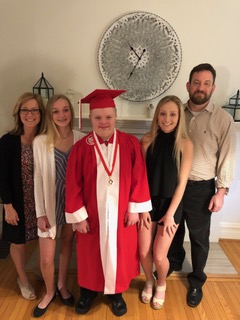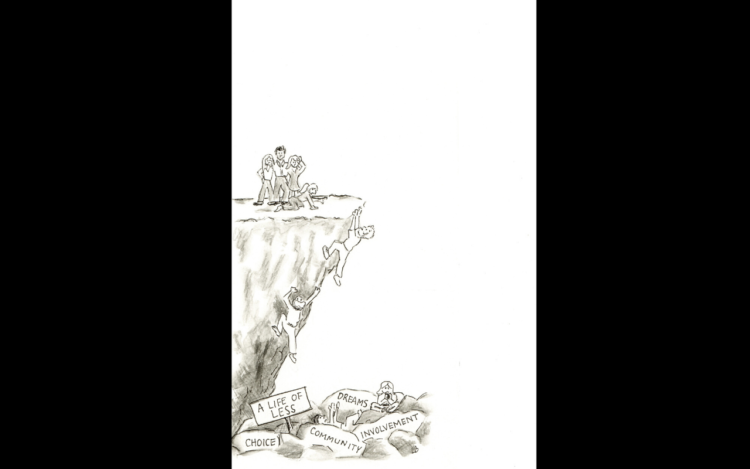'The Cliff' Between My Son With a Disability and Community Inclusion
“Can you please help me? My 19-year-old son with Down syndrome has fallen off ‘The Cliff!’”
Yes, Jake has fallen, but he is hanging on, just over the side. Most people won’t be able to see “The Cliff,” but it is there. As Jacob struggles to stay engaged, he can see others who have fallen before — some are grasping to the sides; others lay at the bottom.
“The Cliff” is the mental image associated with the transition that a person with an intellectual or developmental disability (I/DD) will encounter as he or she approaches 18 to 21 years old, as arranged school programs come to an end. “The Cliff” is a life with fewer opportunities in our general public, that you and I experience freely.
As Jake’s mother, I can say that this transition has been much worse than what my husband and I experienced when first receiving his genetic diagnosis. This struggle is not because Jake has Down syndrome. Like his sisters, Jake was perfectly created. It is due to the limited opportunities available for him to experience life with others his age within his natural community.
I am thankful that Jake’s sisters have futures full of opportunities; to create lives that are meaningful based on their interests and dreams. But, for Jake, his current future does not hold the same. It’s one that is not set by his desires, but is dictated by what is available within our society.

The adult world’s practices have not caught up to the inclusion practices of our educational system. This oversight is not intentional. Instead, I feel it is a by-product of the federal mandates with the Individuals with Disabilities Education Act (IDEA) ending at age 21. There are federal laws, such as the Americans with Disabilities Act (ADA), that require “access” to the general public, but there are no laws forcing communities to provide inclusive support to adults with disabilities as IDEA does.
Currently, the support most adult agencies provide is still within a segregated setting, separate from the rest of us. Separate is not equal. It robs adults with disabilities opportunities to fully experience their communities. Just as importantly, it robs us of the chance to experience what these individuals have to offer.
This future sounds bleak, but it doesn’t have to be this way.
I don’t believe we need federal mandates to make a change. What we need is you, the members of our community, from all parts of life (employment, education, social, spiritual, community living) to help build a bridge.
This bridge must be creative in design as it will branch off in different paths. It will start at “The Cliff” and connect to a paradigm shift. A shift that takes adults with disabilities away from isolation to one of community options. A bridge that is forged on human value and a sense of commitment to ask, “How can we make this work?” A bridge that has signage along the way guiding adults with I/DD to community opportunities.
This bridge towards community integration will provide daily interactions between people with and without disabilities; interactions which will break down the walls of misunderstanding and allow us to learn from one another. Studies show increased learning when students with and without disabilities are educated together. Businesses are starting to find an increased overall productivity level when employing people with disabilities. It is a win-win all around!
A choice for community integration is what adults with disabilities and their families have advocated for as seen in the Olmstead Case in 1999. To have the option to work, live, worship and recreate in a desegregated environment. There are many adult support agencies working hard to make this shift.
What am I asking? Help create opportunities for community involvement for Jake and others with disabilities so they can live a life of choice, just as you and I do. Explore ways to make your community (work, recreation, worship, etc.) more equitable. As you do this, don’t follow the path to “The Cliff” by creating additional segregated programs. Hold the bridge sturdy with the commitment to see value in all. Look for ways to invite people with disabilities to participate within your current opportunities offered to the general public. The adult agencies are ready to help make this work.
All we need is you!

If you live or work in St. Louis, MO and want more information on the adult support agencies or more information about what’s available for adults with I/DD and community support visit the resource IDDhelp.
Illustration credit: Laura Bontty
Photo submitted by contributor.

